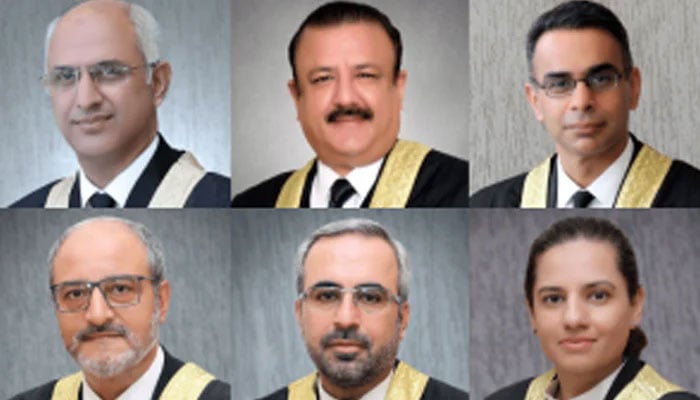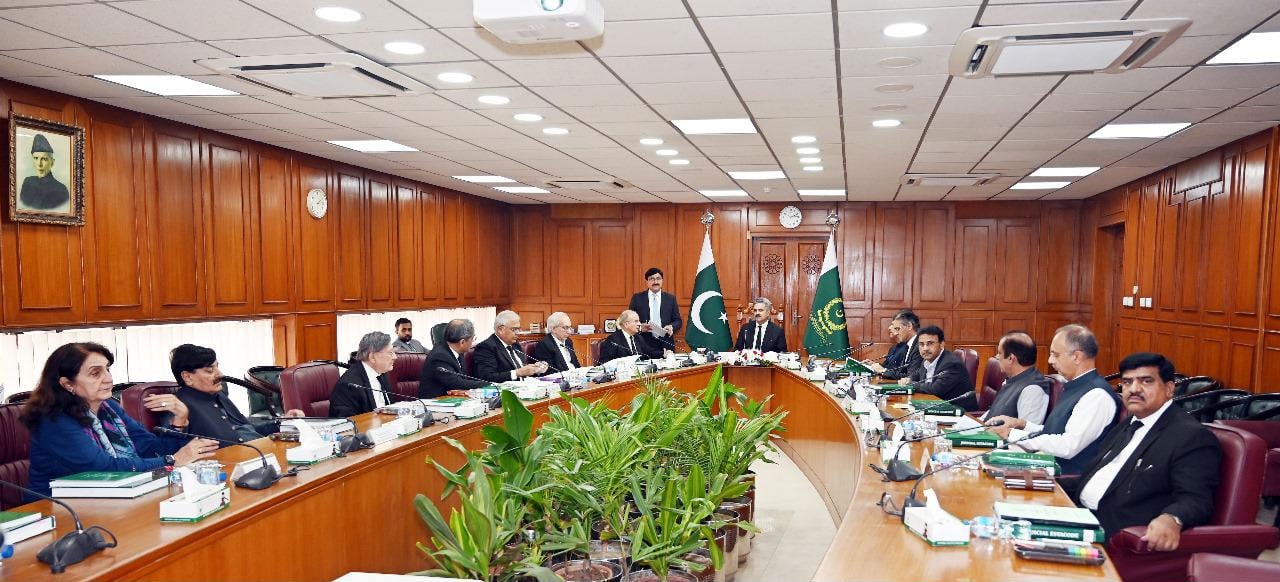
The Supreme Judicial Council (SJC) has determined to widen session on a letter written by six judges of Islamabad Excessive Court docket (IHC), accusing the intelligence companies of interference in judicial affairs.
The choice was taken throughout the assembly of prime judicial physique underneath the chairmanship of Chief Justice of Pakistan (CJP) Justice Yahya Afridi, mentioned a press launch issued by the Supreme Court docket.
The assembly was attended by Justice Mansoor Ali Shah, Justice Munib Akhtar, IHC Chief Justice Aamer Farooq and Balochistan Excessive Court docket Chief Justice Muhammad Hashim Kakar.
Based on the press launch, the council mentioned the agenda gadgets concerning amendments to the code of conduct of judges underneath Article 209(8) of the Structure and letter of six judges of Islamabad Excessive Court docket.
“The Council thought of completely different choices and modalities on this regard and determined to widen the session on the topic because the code applies to the heads of various establishments along with judges and determined to take up the matter within the subsequent assembly as soon as once more,” it acknowledged.
On March 25, a letter of six judges of the IHC got here to floor whereby they’d demanded former Chief Justice of Pakistan (CJP) Justice Qazi Faez Isa to convene a Judicial Conference to think about the matter of interference in judicial features, or intimidation of judges in a fashion that undermines independence of the judiciary.

The IHC judges — who wrote the letter to the SJC — embrace Justice Mohsin Akhtar Kiyani, Justice Tariq Mehmood Jahangiri, Justice Babar Sattar, Justice Sardar Ejaz Ishaq Khan, Justice Arbab Muhammad Tahir, and Justice Saman Fafat Imtiaz.
The letter emerged days after the Supreme Court docket declared the elimination of former IHC Justice Shaukat Aziz Siddiqui unlawful, directing that he could now be thought of as a retired decide.
The decision famous that the SJC proceeded towards Justice Siddiqui on the “assumption that the reality or falseness of the allegations levelled” by the previous decide was “irrelevant”.
On Nov 2, The Information reported that the IHC judges held a gathering with CJP Afridi and expressed their reservations over the issues they face whereas discharging judicial features.
Though, there was no official affirmation concerning the event, nevertheless, it was learnt that CJP Afridi, after taking oath of his workplace, had held a gathering with IHC Chief Justice Aamer Farooq, who can be the chairman of the excessive court docket’s administrative committee.
In the meantime, the highest judicial physique — in immediately’s assembly — additionally mentioned intimately the difficulty of rule-making of the council and institution of its secretariat.
It agreed to the proposal of registrar and determined that rule making means of the council must be undertaken and draft must be positioned earlier than the council within the subsequent assembly.
The JCP authorised CJP Afridi to rent the providers of a reliable particular person with confirmed capability to work as secretary of the council for a interval of three months who could be tasked to help the council in conducting its conferences, oversee rule making train, and agency up infrastructure and human useful resource necessities of the Council’s secretariat.
JCP assembly
Alternatively, CJP Yahya Afridi additionally chaired the second assembly of the Judicial Fee of Pakistan constituted underneath the recently-enacted twenty sixth Constitutional Modification to think about a single level agenda of formation of a constitutional bench throughout the Sindh Excessive Court docket.

It was attended by Justice Syed Mansoor Ali Shah, Justice Munib Akhtar, Justice Ameen-ud-Din Khan and Justice Jamal Khan Mandokhail (by way of video hyperlink); Justice Muhammad Shafl Siddiqui, SHC Chief Justice, Legislation Minister Azam Nazeer Tarar, Legal professional-Normal for Pakistan Mansoor Usman Awan, Senator Farooq H Naek; Senator Syed Shibli Faraz, MNA Sheikh Aftab Ahmad, Chief of Opposition in NA Omar Ayub, Roshan Khurshid Barucha, Sindh Legislation Minister Zia ul Hassan Lanjar, member of Sindh Bar Council.
Following an intensive and considerate change of views, the fee unanimously endorsed the proposal put forth by SHC CJ Muhammad Shafi Siddiqui that every one the present excessive court docket judges are nominated to be the judges of constitutional benches for expeditious disposal of the present large backing of circumstances.
